Dental Implants Morgan Hill
Enjoy a Restored Smile & All Its Benefits

Dental implants have been considered the “gold standard” for replacing missing teeth for quite some time – these posts are capable of restoring one or multiple lost teeth in terms of look, feel, and functionality. They also offer several unique benefits that dentures, bridges, or other types of restorations cannot match. To learn more about dental implants in Morgan Hill and how they can restore your smile and improve your quality of life, feel free to contact our team at Morgan Hill Dental Care!
Why Choose Morgan Hill Dental Care for Dental Implants?
- Team with Several Years of Experience with Implant Placement
- Advanced Dental Technology for a Streamlined Patient Experience
- Insurance Accepted and Flexible Financing Options Available
What Are Dental Implants?
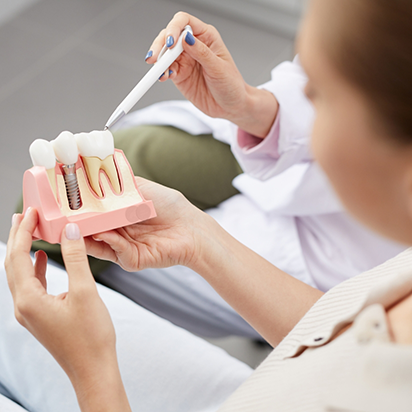
Dental implants refer to small posts that are surgically placed beneath a patient’s gumline, directly into their jawbone. These posts are made from biocompatible materials such as titanium and zirconia, meaning they’re capable of fusing with the jawbone and functioning as replacement tooth roots – something other dental restorations can’t do. By replacing the roots of missing teeth, they offer incredible stability for a corresponding dental restoration, as well as unmatched oral functionality. They can last for several decades under ideal circumstances.
The 4-Step Dental Implant Process
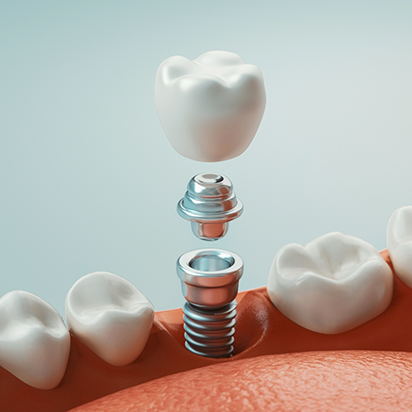
Dental implants are the best tooth replacement option out there. Because of their unique ability to replace the roots of the missing teeth, they allow for a wide range of additional benefits that you can’t find with traditional dentures or dental bridges. To achieve this, getting dental implants requires a unique multi-step process that takes place over the course of several months. Everyone’s treatment plan looks a little bit different, but here are the main steps that everyone can expect.
Initial Dental Implant Consultation

The first step of the dental implant process involves coming in for a consultation. Patients need to be in good oral health and have sufficient jawbone density to receive dental implants, and we can quickly determine if you’re a good candidate. Some patients may need gum disease treatment, a bone graft, or another type of preliminary procedure before they can receive their implants. Once the gums and jaw are in good condition, we can move onto planning the rest of your treatment.
Dental Implant Surgery

We’re proud to be able to complete the entire dental implant process in-house, meaning you won’t have to coordinate with other teams or other offices. As for the actual procedure, it’s surprisingly straightforward, completely pain-free, and often only takes one appointment (though this also depends on the number of implants being placed).
Dental Implant Osseointegration & Abutment

Once they’ve been placed, the implants will begin fusing with your jawbone over the next several months. This part of the process, known as osseointegration, must occur in order for the implants to remain stable. Once this has happened, we can call you back to attach your abutments, which eventually secure your replacement teeth. Impressions are taken so your replacement teeth can be customized at the dental laboratory.
Delivery of Dental Implant Restoration(s)

Dental implants can be used to support virtually any type of dental restoration, no matter how many teeth are missing. Based on your needs, we’ll provide you with a functional, beautiful restoration that looks and feels just like your original teeth. If everything looks and feels great, you will be free to show off your new and complete smile to the world!
Benefits of Dental Implants

With over half a million dental implants placed each year, these durable, lifelike restorations are quickly becoming one of the most popular ways to replace missing teeth. Thanks to their unique placement inside your jawbone, this modern tooth loss solution provides a wide range of benefits that simply aren’t possible with dental bridges and dentures. Dental implants don’t just restore your smile: they also have the powerful potential to dramatically improve your self-confidence, health, and even your quality of life!
Day-to-Day Benefits

You won’t have to wait long to begin enjoying all the benefits of your newly restored smile! With dental implants, you’ll experience a variety of improvements in your daily life, including:
- The ability to chew your favorite foods, from fresh crunchy vegetables to tougher proteins like red meat.
- Easier cleaning. Your new dental implants can be brushed and flossed just like “real” teeth. No need to soak them overnight, remove them, or purchase any special equipment to clean them.
- Smile with confidence once again, knowing your new teeth both look and feel real and will never slip or come loose during meals or conversations.
Health Benefits

In addition to day-to-day benefits, your dental implants have many health benefits, such as:
- Stimulating the jawbone much like natural tooth roots do, thereby preventing jawbone deterioration that could cause further tooth loss and require a bone graft to correct.
- Protecting your remaining natural teeth from damage due to jawbone deterioration or abrasion from other prosthetics.
- Allowing you to eat a healthy diet and prevent malnutrition.
- Not causing common complications that can occur with other prosthetics, such as tooth sensitivity and gum sores.
- Easier to clean, thereby promoting better oral health and a lower risk of overall health issues.
Long-Term Benefits

Finally, the long-term benefits of your new smile are undeniable. These include:
- Today’s dental implants boast a 95 percent success rate, even after 10 years after placement.
- Your prosthetics won’t need to be replaced every five to ten years like they would with dental bridges or dentures.
- Time is money, and you’ll save both by not needing to replace your dental implants ever five to ten years like you would with bridges or dentures.
Who Dental Implants Can Help

Anyone who has lost one or more teeth can potentially benefit from dental implants, but that doesn’t mean they’re the best solution for everyone’s unique circumstances. Before proceeding, you must consult one of our providers to ensure that this method is right for you.
Then, depending on your exam results, we will either approve you for this treatment or recommend other appropriate solutions. Continue reading to learn more about the traits of good dental implant candidates in Morgan Hill, and feel free to contact us if you have additional questions!
Who Is a Good Candidate for Dental Implants?

Unlike alternative solutions, like dentures and dental bridges, these restorations involve surgically placing a titanium rod into your jawbone to function like a root. Although potentially anyone who has missing teeth can benefit from this treatment, we must first determine that you’re healthy enough to undergo the procedure.
Our team in Morgan Hill will verify the following during your initial examination:
- Your general health. If you have diabetes, heart problems, or recently suffered a stroke, we’ll need to ensure that your condition has improved and is under control before approving a surgical procedure that can put additional stress of your body and pose a risk of infection.
- Commitment to oral hygiene. Dental implants can’t decay, but they rely on healthy bone and connective tissues to remain in place. You must continue brushing and flossing twice daily to remove plaque and bacteria that contribute to cavities and periodontal problems that can destabilize your new tooth.
- Sufficient jawbone density. Your jaw begins to thin when teeth go missing, and if it’s too frail, it can’t support dental implants. Fortunately, and additional bone graft procedure can often bulk it up enough to continue.
Missing One Tooth

If we confirm that you’re strong and healthy enough for dental implants, we’ll recommend an appropriate method to rebuild your smile. For example, if you’ve lost a single tooth, we can place one support pole into the empty space, which will eventually be capped with a customized dental crown made to look like your natural teeth for seamless results. This porcelain restoration reflects light like enamel and can last 10 to 15+ years with the right care.
Missing Multiple Teeth

If you’ve lost one or several teeth in a row, two dental implants can be placed on either side of the wide space in your smile to anchor a specially designed dental bridge to restore your mouth’s appearance and functionality. Unlike standard bridges, which require that healthy teeth be thinned to serve as abutments, this method preserves them.
Missing All Teeth
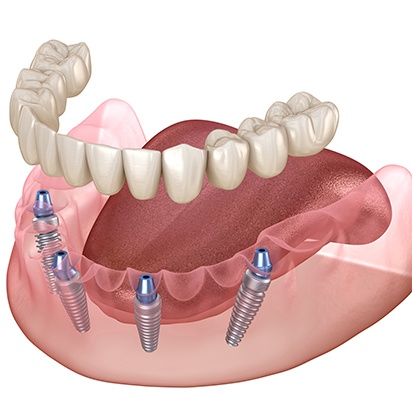
Those who have lost most or all of their natural adult teeth can receive four to eight implants to hold dentures in place and remake their arches completely. This is often an ideal solution for denture patients seeking a more permanent repair.
Learn More About All-On-4 Dental Implants Learn More About Implant Dentures
Bone Grafts
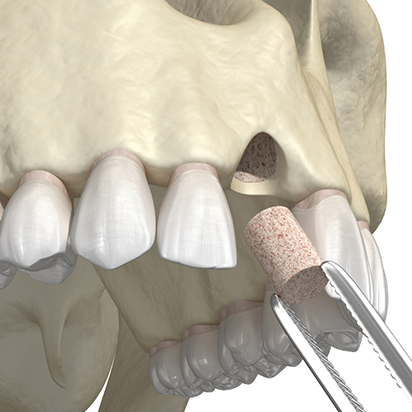
According to clinical studies, dental implants have a demonstrated long-term success rate of well over 95%. However, the long-term stability and success of a dental implant depends upon a number of factors, like the presence of sufficient bone at the time of placement. In cases of periodontal disease or following the extraction of a tooth, bone volume is often lost. By placing a bone graft in the extraction site, or prior to the placement of a dental implant, we can establish sufficient bone support for a sturdy and stable dental implant.
Cost of Dental Implants

Dental implants are the best tooth replacement option out there. However, many patients are hesitant to commit to treatment due to fear of cost. Everyone’s treatment is a little bit different, so the cost varies from patient to patient. During your consultation, we will go over the estimated cost of your treatment in detail. Until then, here are some things to take into consideration.
Preliminary Treatments & Dental Implant Surgery

Sometimes, patients need preliminary treatment before they can get dental implants. This includes things like gum disease treatment, tooth extractions, bone grafting, sinus lifts, and other services. It is important to consider the cost of these procedures if they apply to you. The good news is that the cost of preliminary procedures often receives partial coverage if you have dental insurance. Remember that every plan is a little bit different, so it is best to contact your provider ahead of time to confirm your coverage.
The Parts of Your Dental Implant

There are numerous factors that contribute to the cost of dental implants. Here are the most prominent ones:
- Number of Dental Implants: The number of teeth that you are missing, and their locations determine the number of dental implants you need. The more implants, the higher the cost.
- Restoration Type: Dental crowns, bridges, and dentures all have different costs. Generally speaking, the larger the restoration, the higher the cost.
- Materials: In most cases, dental implants are crafted from surgical titanium. However, they are also sometimes made from zirconia.
- Brand: Just like other products, dental implants come from a variety of manufacturers. This influences the cost.
How Dental Implants Can Save You Money

It is tempting to try to save money by choosing a more affordable tooth replacement option, like dentures. Dentures are ideal for many people, but they don’t provide the same lifelong benefits that dental implants do. Dental implants can help you save money in the long run. This is because you will no longer need to spend money on frequent repairs and replacements, and you don’t’ need to stock up on adhesives and soaking solutions to maintain your smile. Dental implants help to prevent serious oral health issues, meaning that you can avoid costly restorative treatment in the future.
Does Dental Insurance Cover Dental Implants?

Dental insurance does not usually cover the cost of dental implants themselves. That being said, it does often cover parts of the costs of preliminary procedures and the restoration that is attached to the implants. Keep in mind that every dental insurance plan is a little bit different, so coverage can vary. At Morgan Hill Dental Care, we are proud to be in-network with Delta Dental PPO, and we are happy to file claims on your behalf. If you have any questions or concerns regarding your benefits, don’t hesitate to contact us.
Making Dental Implants Affordable

If you don’t have dental insurance or you don’t have coverage for your treatment, this doesn’t mean that you will be left completely on your own. With our In-House Dental Savings Plan, you can save on services completed at our practice. We are also happy to accept payments through CareCredit and Sunbit financing. These third-party financing companies can split the cost of your treatment into manageable monthly installments with little to no interest. If you have questions or need help applying, give us a call!
Dental Implant Post-Op Instructions
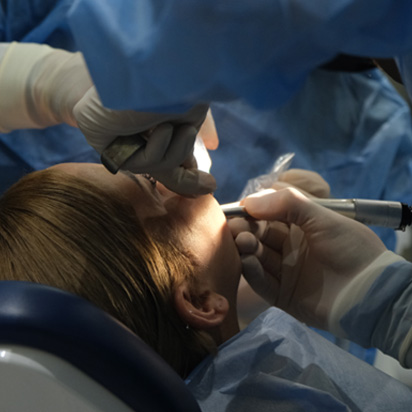
Dental implants are the best tooth replacement option out there. Since they replace the roots of the missing teeth, they allow for a wide range of additional benefits that you can’t find with dentures or dental bridges. To achieve this, getting dental implants requires a multi-step process, including a surgical procedure. To help you heal as quickly and comfortably as possible, we will provide you with detailed post-op instructions. They will look something like this.
What to Do Directly After Dental Implant Surgery

The most important part of dental implant recovery is not disturbing the blood clot located at the surgical site. This clot is necessary for the area to heal properly. Here are some things that you should avoid to keep this clot in place.
- Spitting: Swallow your saliva or use a tissue.
- Straw: The suction of the straw can dislodge the blood clot.
- Smoking: Don’t smoke following your procedure.
- Touching: Keep your tongue and fingers away from the surgical site.
Common Side Effects When Recovering from Dental Implant Placement

Side effects are common following dental implant placement surgery. Here are some that you may run into.
- Bleeding: Minor bleeding during the recovery period is common. This can be reduced with clean gauze and light pressure.
- Inflammation: For the first 72 hours following your procedure, you may have some swelling. You can lessen this with a cold compress.
- Discomfort: Soreness is common following dental implant placement. This can be managed with over-the-counter pain relievers.
Your Diet After Dental Implant Surgery

After your procedure, it’s ideal to stick to softer foods so you don’t aggravate the surgical site. Here are a few suggestions.
- Scrambled eggs
- Mashed potatoes
- Pasta
- Soup
- Oatmeal
- Applesauce
- Yogurt
- Pudding
- Ice cream
Post-Op Health & Oral Hygiene

On the day following your surgery, brush your teeth and floss like you normally would. Just be particularly careful to avoid the dental implant site. To clean this area, gently rinse your mouth with salt water, after meals. When you pick out a mouthwash, choose one that doesn’t contain alcohol. This is because alcohol can irritate the surgical site, causing discomfort.
What to Do After Your New Teeth Are Attached

Once your replacement teeth have been secured to the dental implant, the difficult part is over! You might experience some slight discomfort and sensitivity as your mouth adjustments, but this should be easy to manage at home. At this point, you shouldn’t run into any swelling, bleeding, or extensive recovery. If you have any concerns or questions regarding your post-op care, let us know so we can help.
Maintaining & Caring for Your Dental Implants

Your new dental implants are life-changing restorations that have the potential to keep your smile complete, strong, and healthy for a lifetime. However, that can only happen if you take care of them. Neglecting to protect your prosthetics from damage and infection could cause implant failure and could even result in a bone graft procedure.
Thankfully, caring for them is easy. With just a few simple precautions and healthy habits, you’ll be able to enjoy your newly rebuilt smile for the rest of your life!
Make Oral Hygiene a Priority

While it’s true that your dental implants cannot get cavities, you still do need to practice excellent dental hygiene to ensure they last. Oral health problems like gum disease can increase your risk of implant failure. Here are a few tips for caring for your new smile:
- Brush your teeth (both real and prosthetic) twice a day and floss once daily.
- Visit your dentist twice a year for your biannual check-up and cleaning, even if you have no remaining natural teeth.
Eat a Healthy Diet

The great news about dental implants is that you can use them to eat whatever you want, so feel free to enjoy a full, nutritious diet packed with the fresh, healthy foods you love. However, beware of overindulging in hard, sticky, or sugary foods, as these can damage your real and prosthetic teeth.
Eating a diet full of foods rich in calcium and vitamin C can help keep your jawbone strong and your gum tissue healthy, reducing your risk of implant failure.
Break Bad Habits
Bad habits can cause your dental implants to break off or fail, so be sure to make positive changes to improve your oral and overall health. Consider quitting smoking, vaping, or chewing tobacco, all which can slow healing and encourage infection. Furthermore, stop using your teeth as tools and chewing on hard objects, as this can damage the crowns of your new implants.
Protect Your Dental Implants

Your dental implants may be strong and durable, but unfortunately, they’re not indestructible. Thus, be sure to protect them from accidental damage as much as possible. If you play sports, wear a sports mouthguard. If you grind your teeth (bruxism), wear a night guard. These steps can help protect your new smile from costly and painful dental emergencies.
Schedule Regular Dental Check-ups

Even if you have few or no remaining natural teeth, it is still very important that you visit Morgan Hill Dental Care every six months for your regular, biannual check-up and cleaning appointments. These appointments are your dentist’s opportunity to monitor your dental implants and spot any issues that may arise before they get worse.
Dental Implant FAQs
What is the best method of replacing missing teeth? Are dental implants worth it?
If you've lost a tooth due to injury, decay, gum disease, or any other reason, we recommend dental implants to replace missing teeth. Dental implants come the closest to replicating the look, feel, and function of your natural teeth.
Are dental implants painful?
Dental implants are placed into the jawbone and mirror the same function as the root of a tooth. The procedure for dental implants is usually performed while a patient is sedated. Patients who undergo IV sedation must have an empty stomach and transportation home following the procedure. Most sedation patients will have little to no memory of the procedure occurring.
What are dental implants made of?
Generally, dental implants are made out of a biocompatible metal such as titanium. Biocompatible metals are also used for other common bone implants (such as shoulder, hip, and knee replacements). The visible portion of the implant is usually made out of porcelain and is custom-made to match your existing teeth.
Are dental implants permanent?
Dental implants are designed to fuse to the bone, which makes them become permanent fixtures. Typically speaking, the success rate is nearly 100%. There are few cases in which the implant will not fuse as intended and must be removed. If this happens to occur, the procedure can be attempted again a few months later.
Are dental implants expensive?
Dental implants are not usually covered by dental insurance, but may be covered under a patient's medical insurance. Our office and your insurance company can discuss coverage options with you based on your individual case and treatment plan.
I Need a Checkup & Cleaning I am Worried About Gum Disease I Need a Dentist for My Child I Have a Cavity or Broken Tooth I am Missing One or More Teeth I Want to Enhance My Smile I Want a Straighter Smile I am Scared of the Dentist I Have a Dental Emergency Oral Surgery View Our Services
